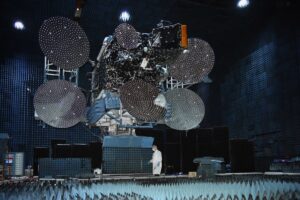Maxar trying to sell GEO business as defective components compound troubles

WASHINGTON — Maxar Technologies executives said selling the company’s struggling geostationary satellite manufacturing business is now the most likely path it will take to break free from a business that is operating at a loss.
With downsizing of Maxar’s Space Systems Loral division no longer considered sufficient and a complete shutdown of its factories in Palo Alto, California, viewed as undesirable, Howard Lance, Maxar’s CEO, said discussions are underway with prospective buyers for SSL, a world-renown builder of telecom satellites whose profitability struggles have weighed down on Maxar’s overall financial performance.
“Our primary path remains to sell the business,” Lance said Oct. 31 during an earnings call. “We have multiple interested parties. We are in discussions and are still hopeful to have an answer that we can announce between now and the end of the year.”
Several satellites SSL has under construction will take weeks or months longer to complete thanks to defective components from a supplier Maxar declined to name. Lance said the component problem is driving up costs and exacerbating profit loss in space hardware.
SSL is already operating less efficiently than in years past, Lance said, because of layoffs meant to keep workforce numbers in line with the dwindling number of satellites under construction. The component issue, which means duplicate work and longer production timelines, is mostly solved but may bleed into the last few months of this year, he said.
Maxar’s Space Systems division reported $263 million in revenue for the three months ending Sept. 30, a decline of 12 percent over the same period last year. Year-to-date revenue, at $886 million, is down 10 percent compared to the first nine months of 2017. The company said that without SSL’s geostationary satellite business, which was down 31 percent year-over-year, Space Systems revenue would have grown on the strength of small satellite work and business with the U.S. government.
Maxar’s total revenue for the quarter (compared to the combined revenues of MDA Corp. and DigitalGlobe in 2017 prior to the merger that formed Maxar) was down 10 percent year-over-year to $508 million. In an earnings release and a conference call with investors, Maxar stressed that the company’s financial performance would be much stronger without its GEO satellite business. Maxar said its revenues would have only decreased 1 percent this year if that hadn’t been weighed down by SSL’s GEO results. The overall company, Maxar said, could see 4 to 5 percent growth next year without what Lance described as “significantly negative” profit margins the GEO business experienced.
Since June, Maxar executives have been weighing “strategic alternatives” for its GEO business as slow order rates for new satellites took a toll on SSL. Last month, SSL lost a contract with Israeli satellite operator Spacecom to build the Amos-8 satellite as Israel seeks to prop up its domestic manufacturer Israel Aerospace Industries. That’s left SSL with just one new satellite order this year: BSAT-4B for Japanese operator BSAT.
Lance said this year may end with just six to seven large GEO communications satellites competed worldwide — about the same as last year. Manufacturers had grown accustomed to 20 to 25 orders annually, making the change of pace particularly distruptive.
“This is really unprecedented,” he said. “We are managing as best we can.”
Biggs Porter, Maxar’s new chief financial officer who joined in August, said GEO satellites make up about half of Maxar’s Space Systems revenue, and produce very little profit for all the cost of production.
In a worst case scenario where Maxar couldn’t find a buyer for SSL, Lance said Maxar should still make money by selling off the Silicon Valley property, which is worth an estimated $150 million to $200 million.
Lance said Maxar’s Space Systems business is “solid” without GEO satellites. Maxar is one of three companies NASA chose in September for a small satellite development contract worth up to $750 million. The company is also competing as a team with Thales Alenia Space against Airbus to build an estimated $3 billion worth of small telecom satellites for Canadian satellite operator Telesat.
Telesat declined to say if the Telesat contract, expected mid-next year, is for the full 300-satellite constellation or just a fraction of the system.
from SpaceNews.com https://ift.tt/2AEXFEq
Comments
Post a Comment